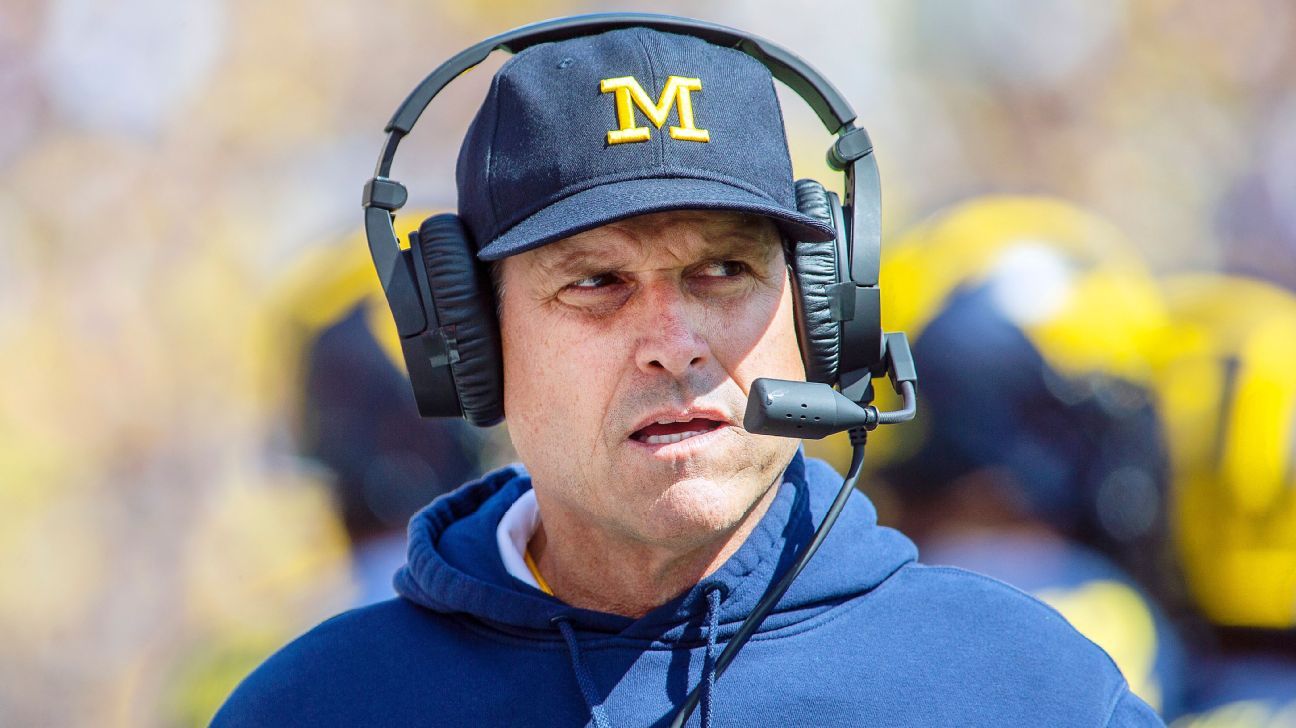
Michigan coach Jim Harbaugh wants college football players to have the ability to enter the NFL draft whenever they are ready to. He also wants players who go unselected in the draft to be allowed to return to school.
Harbaugh wrote an open letter Thursday addressed to the "College Football Community," laying out a proposal that would provide more flexibility for college players who consider making the jump from college to pro football.
Current NFL rules dictate that a player must be at least three years removed from high school before entering the draft. Current NCAA rules do not allow players to return to college football once they declare for the draft, even if they haven't used up all of their NCAA eligibility.
"There are 'early bloomers' capable of competing in the NFL and earning a livelihood at an earlier age," Harbaugh wrote in the letter. "The goal would be to create a scenario that makes adjustments for all current and future student‐athletes that puts the timeline for transition to professional football at their discretion and that of their family. I propose an option that allows them to make the decision that is best for them."
Harbaugh also said he would like to see rules that allow college football players to consult with agents for advice before signing any professional contracts as long as the athlete doesn't receive any compensation as part of that relationship. Under Harbaugh's proposed plan, a player would be allowed to enter his name in the draft and return to school if he is not picked in the first seven rounds of the draft. If a player is selected in the draft or signs a free agent contract, he would relinquish the rest of his college eligibility under Harbaugh's plan.
The draft age has been a topic of debate for most of the past decade. About half of college coaches support the idea of allowing players to head to the NFL whenever they want, according to Todd Berry, the executive director of the American Football Coaches Association.
Berry said coaches who support the idea see it as an alternative to allowing college players to profit from endorsement deals while playing in college. The NCAA's Board of Governors announced last week that it supports a plan to allow college athletes more opportunities to make money during their time in school.
"Some say. 'Hey let's keep this [current NCAA] model as it is, and if they want a way to make more than that, they can go pro,'" Berry said Thursday.
Harbaugh's two-page letter makes no mention of his stance being related to the potential changes of NCAA rules about name, image and likeness. A Michigan spokesman said Harbaugh's letter was not a response to or related to the NCAA working group's recent announcement about potential changes to name, image and likeness rules.
Harbaugh previously mentioned his desire to see NFL draft rules changed shortly after California passed a law last fall that has prompted the ongoing push to change name, image and likeness rules.
Berry said coaches who are against the idea of opening up the draft are worried it would lead to "a lot of young people making bad decisions thinking that they're going to get drafted." Changing the rules to allow players to return to college after entering the draft would require a major shift in the recruiting calendar to allow coaches to manage their rosters, Berry said.
"We'd have to have a dramatic change in when our signing dates are," Berry said. "Otherwise, you'd have to make offers not knowing what you'd have to replace. ... It would require a complete overhaul of the recruiting calendar."
Harbaugh's proposal includes stipulations that he says helps maintain the goals of players getting their diplomas. Under his plan, schools would be responsible for covering the costs of a player's education for different lengths of time, depending on how long the player was a member of the football program. For example, if a player left for the draft after his freshman season, the school would be responsible for paying for one additional year of education if the player decided to return to school after his pro career was over.
Harbaugh also said in his letter that, in the future, he'd like to see college football create a "clean, clear and concise" rule that each player gets five years of eligibility that eliminates the redshirt rules that currently limit a player to four years of participation during a five-year window.
He said he would also like to get rid of the "hard cap" that currently restricts teams from signing more than 25 new scholarship players per year.
Harbaugh said he's hoping his letter will stoke a conversation about the need for change. On matters where the opinions of the coaching community are split 50-50, Berry said his organization generally does not press hard for change until a heavy majority consensus can be reached.















 Phone: (800) 737. 6040
Phone: (800) 737. 6040 Fax: (800) 825 5558
Fax: (800) 825 5558 Website:
Website:  Email:
Email: 






